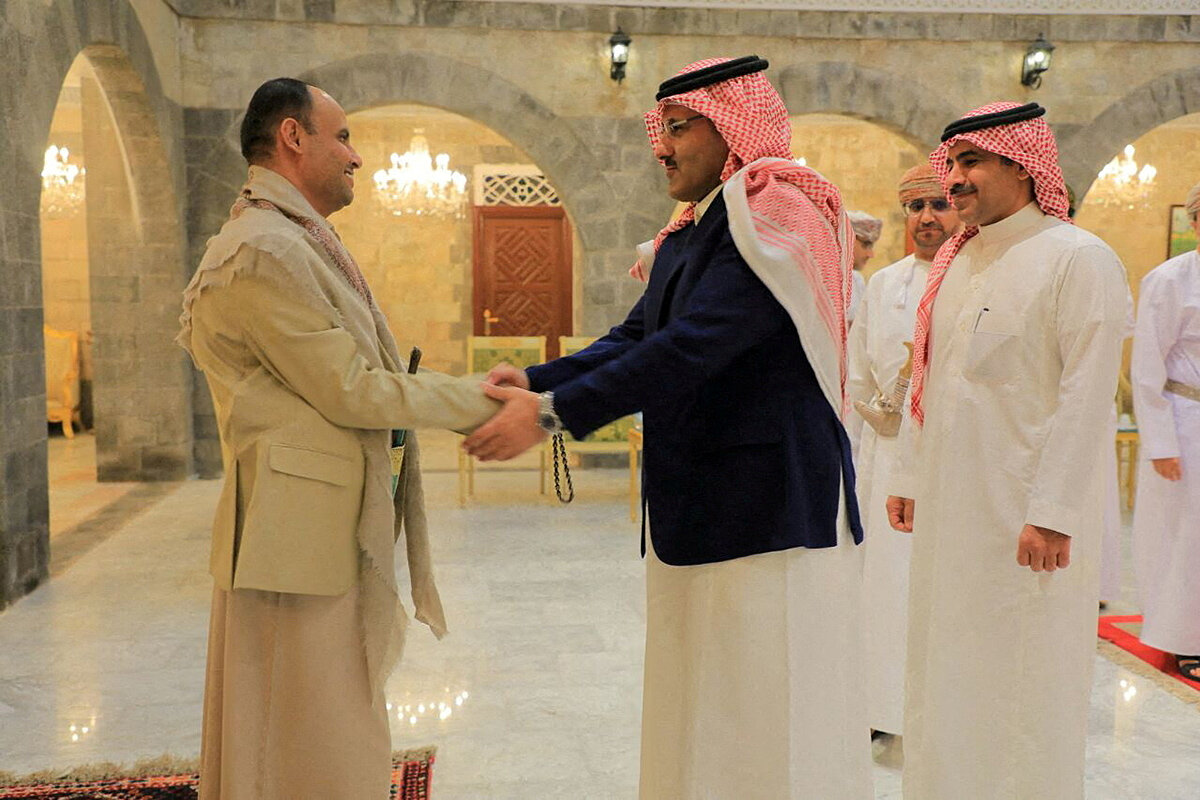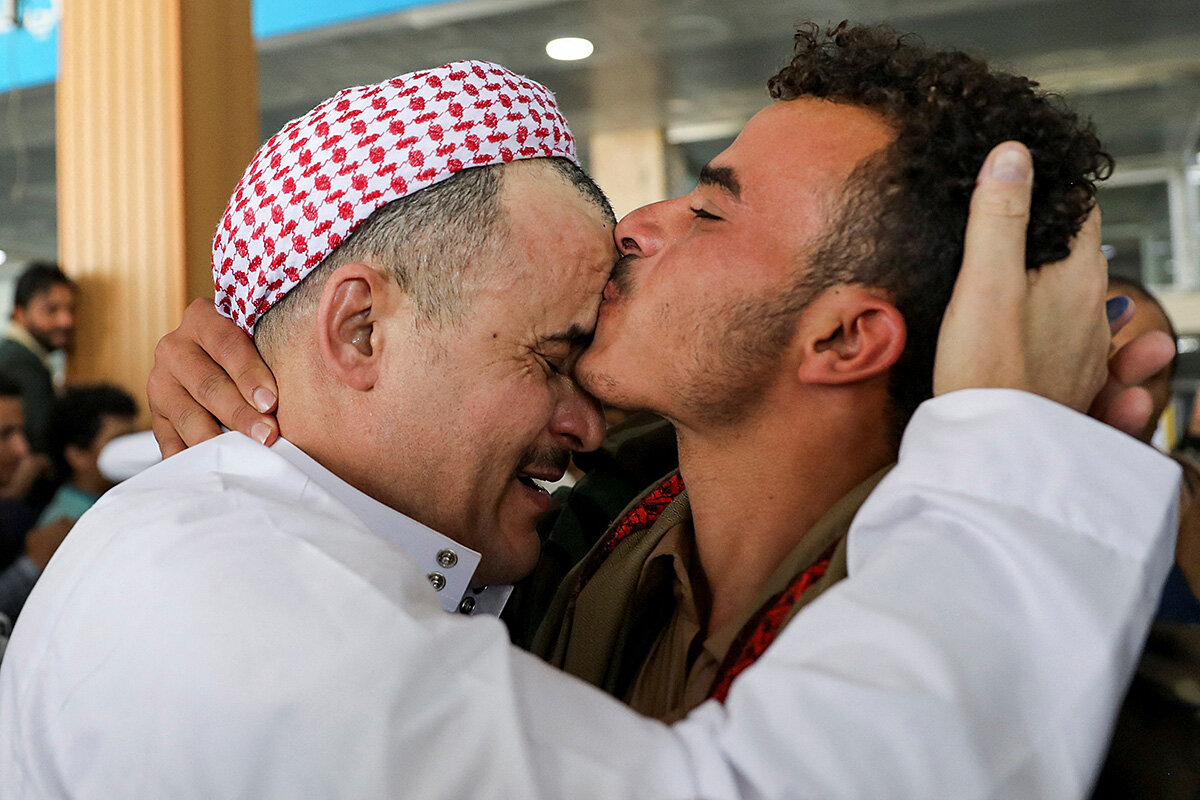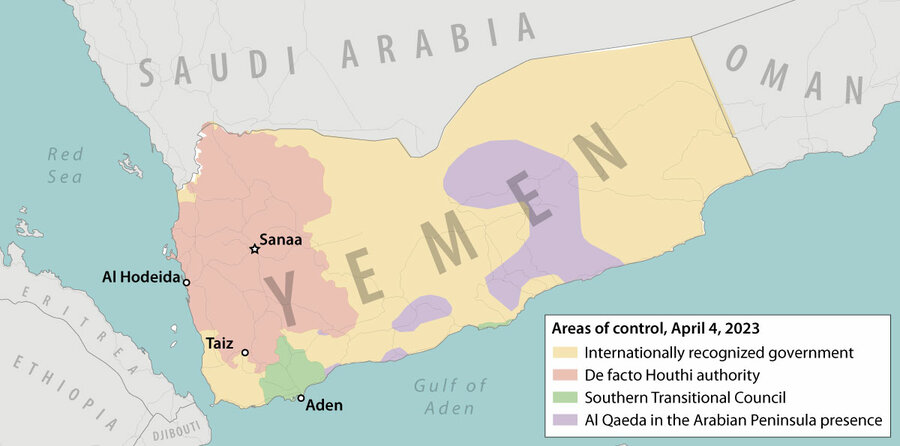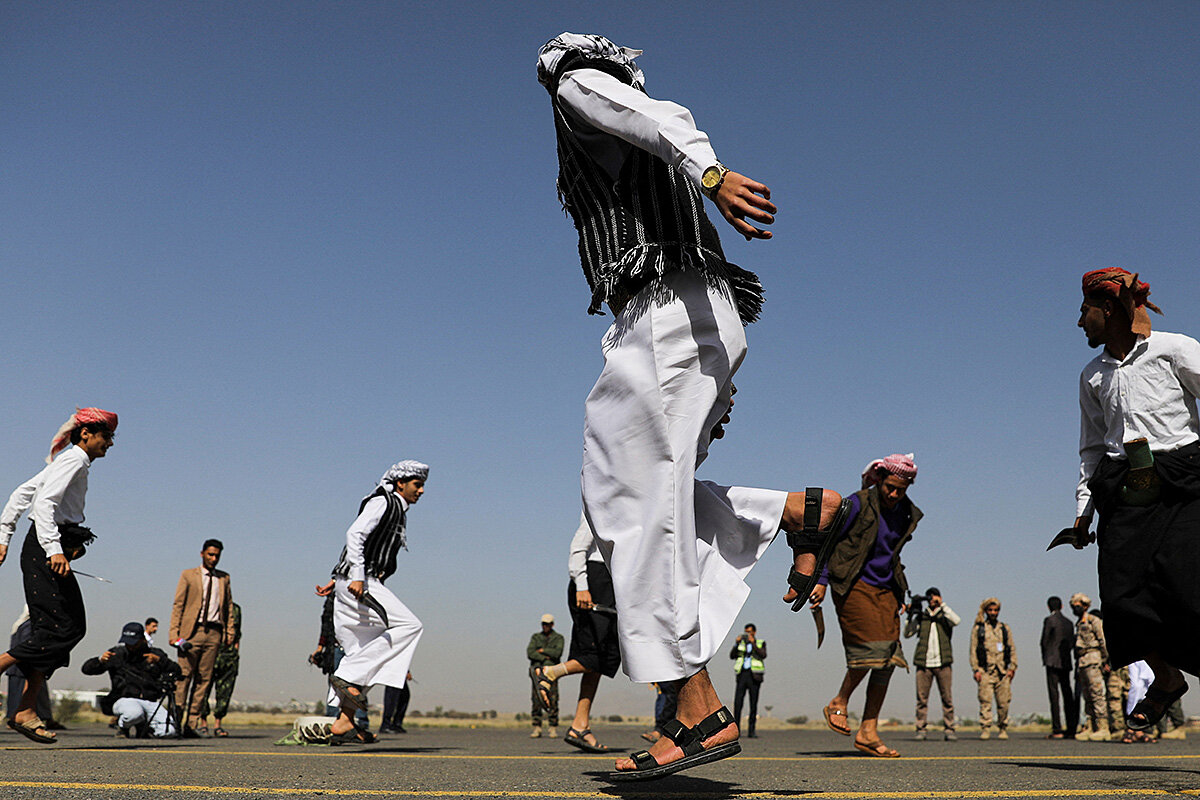Saudis, Houthis shake hands in Yemen. Peace will take much more.
Loading...
| LONDON
Throughout eight years of war in Yemen, the scene that unfolded a week ago appeared unthinkable: A senior official from Saudi Arabia arriving in the capital, Sanaa, to publicly shake hands, smile, and negotiate with sworn enemies – the Iran-backed Houthi rebels who control the capital and the northwest of the country.
Saudi Arabia’s military intervention against the Shiite Houthis began in 2015. Bolstered by extensive American military and intelligence support, it came to include 25,000 air raids, according to a count by the Yemen Data Project. The years of fighting created one of the world’s worst humanitarian crises and resulted in the deaths of more than 377,000 Yemenis by the end of 2021 from both war and hunger, the United Nations calculates.
The Houthis have made Saudi Arabia and its coalition allies pay a high price for their failed bid to return to the capital the internationally recognized government after it was ousted by the Houthis. They have launched more than 1,000 missiles and 350 drones into Saudi territory, increasingly deeply since 2019, prompting Riyadh to search for a way out of its military quagmire.
Why We Wrote This
A story focused onThe Saudi-Iran regional rivalry has hung heavily over Yemen’s tragic civil war. But removing the proxy layer of the complex conflict is not enough to secure peace, analysts caution. That requires including other factions.
The accelerated moves follow just weeks after a high-profile rapprochement brokered last month by China between rivals Saudi Arabia and Iran – both of which turned Yemen’s civil war into a proxy battleground to expand their regional influence.
Mohammed al-Bukaiti, a Houthi leader, said on Twitter that a Houthi-Saudi peace deal would be “a triumph for both parties,” and he urged turning “the page of the past.”
And the U.N. envoy for Yemen, Hans Grundberg, told The Associated Press that the talks are “the closest Yemen has been to real progress towards lasting peace.”
Yet even as the Sanaa handshake and talks have sparked hope for progress toward peace in Yemen, bolstered by an initial exchange of some 900 prisoners that began on Friday, experts say the Saudi-Houthi negotiations focus on just one aspect of a complex conflict.
Yemen analysts caution that, while Saudi-Houthi talks are a critical first step toward removing the proxy layer of the conflict, they ignore the other layers of Yemen’s war by excluding other factions. In particular, that includes the internationally recognized government, ruling now from exile in Saudi Arabia, and a separatist militia backed by the United Arab Emirates called the Southern Transitional Council.
Risk of more conflict
The result may be continued conflict among Yemenis, the analysts warn, since any side deal the Houthis reach with the Saudis will give the Iran-backed faction little incentive to abandon their long-held strategic aim of controlling the entire country, or to embrace an inclusive peace process.
“The missile attacks against Saudi Arabia by the Houthis have achieved their goal, which is to pressure the Saudis into surrender,” says Nadwa al-Dawsari, a Yemen expert with the Middle East Institute in Washington.
“This started with the Saudis wanting to completely reverse the [2014] Houthi coup in three weeks, and it ended with senior Saudi officials in Sanaa literally pleading with the Houthis to accept any concessions to simply sign a deal ... to help the Saudis have a face-saving exit out of Yemen,” says Ms. Dawsari.
“The Saudis going to Sanaa is a statement of surrender, a statement of defeat, even if it’s packaged as an attempt to reach peace and end the Yemen conflict,” she says.
In Sanaa, Saudi ambassador to Yemen, Mohammed al-Jaber, met the chief of the Houthi Supreme Political Council, Mahdi al-Mashat, and said the visit aimed to “end the Yemen crisis” with a “comprehensive political solution.”
“There is slight hope that this might lead to resolving some issues, such as salary payments [to civil servants in Houthi-controlled territory] and opening the airports,” says Ms. Dawsari. “But beyond that, Yemenis know this means handing over Yemen to the Houthis, and many are terrified of that scenario.”
“The Saudis and Emiratis have been an obstacle,” she adds. The UAE at first joined the Saudi-led coalition but broke away in 2019 and backed its own militia, resulting in further tension as the UAE and Saudi Arabia have increasingly competed for dominance among Persian Gulf Arabs.
“Even though they helped prevent the Houthis from expanding militarily at the beginning of the war, their competing agendas divided and massively weakened the anti-Houthi camp,” notes Ms. Dawsari.
That has left the Houthis able to extract concessions within the context of U.N. and other peace efforts since 2014, while giving little in return. The Houthis have rejected previous unilateral Saudi cease-fires, but a six-month, U.N.-brokered truce that ended last October still largely holds.
“If the negotiations in their current form succeed, they won’t lead to a durable peace, because the Saudis will have granted de facto recognition to the Houthis ... while excluding other parties,” says Abdulghani al-Iryani, a senior researcher at the Sanaa Center for Strategic Studies, contacted in Amman, Jordan.
“Negotiations between the Yemenis will be imbalanced; it will not be among equals,” says Mr. Iryani. “The Houthis will say, ‘This is what we will give you; take it, or leave it.’”
He says he expects the Houthis to offer an amnesty for the government-in-exile to return, after years of cursing its members as “Saudi mercenaries,” for example, and a symbolic number of Cabinet posts allotted to them in a Houthi-led government, though real power will stay in Houthi hands.
“The Houthis have no intention of preserving the Yemeni state as a united state; they have no intention of sharing power with anyone in a meaningful way,” says Mr. Iryani. “They want their own state on the territory they control,” and to ignore the rest of the country’s lands, which “will eventually turn into ungoverned spaces, open for Al Qaeda and Islamic State.”
Speed of Saudi concessions
After such a heavy investment by Saudi Arabia in the Yemen war, for so many years, analysts have been surprised by the scale and speed of Saudi concessions, which they attribute in part to improving Houthi military capabilities, backed by Iranian expertise.
“By 2019 and 2020, after the increase of Houthi reach into Saudi Arabia, the Saudis were saying, ‘We will withdraw and just let the Yemenis fight it out,’ but it got even more complicated with the Houthis reaching all the way to Riyadh and becoming even more threatening,” says Mr. Iryani.
“I don’t think the Saudis just want to get out, because the Houthis will continue to be a strategic threat to Saudi,” he says.
Dealing with that strategic conundrum may be Saudi Arabia’s biggest concern, as it builds up its Vision 2030, a vast array of spending and building projects the kingdom bills as a “unique transformative economic and social reform blueprint” that is “opening Saudi Arabia up to the world.”
“The Saudis realize that, if they want to exit the conflict, they will have to make great concessions to the Houthis,” says Veena Ali-Khan, a Yemen specialist with the Brussels-based International Crisis Group.
“What is increasingly clear is that the Saudis want to withdraw themselves from Yemen,” says Ms. Ali-Khan. “The Houthis recognize this, so they are trying to extract as many concessions as possible, and it seems to be working.”
The Saudis have been shifting from a military strategy to a diplomatic one.
“What is going to impact their Vision 2030, and prevent tourists coming into the kingdom, is Houthis firing missiles across its border,” says Ms. Ali-Khan.
“So what they see as winning is not necessarily that the Houthis cease to exist, but just ensuring that there is a friendlier Houthi on the border that won’t fire missiles,” she says.










